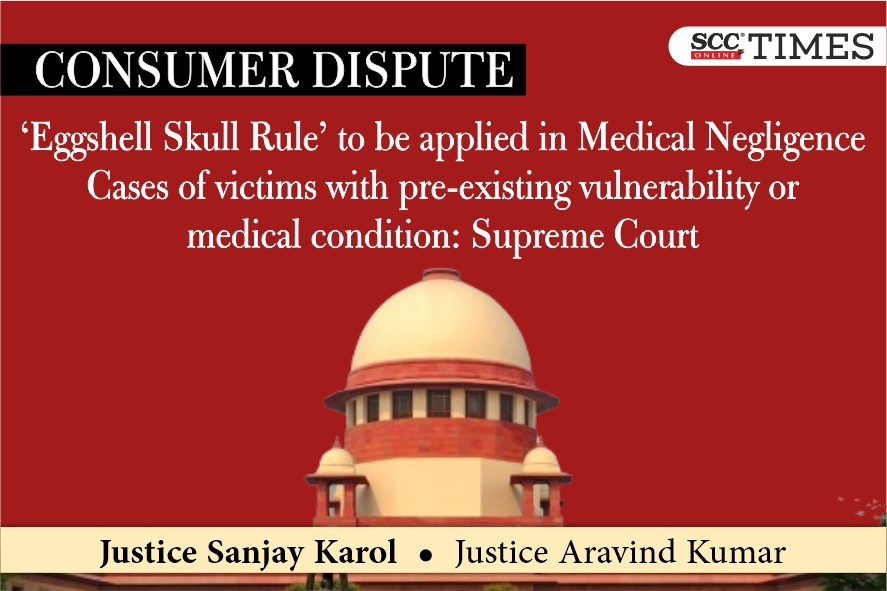Supreme Court: In an appeal regarding medical negligence filed by the appellant for enhancement of compensation, the division bench of Sanjay Karol* and Aravind Kumar, JJ. while setting aside the impugned orders of the National Consumer Disputes Redressal Commission (‘NCDRC’) and State Consumer Disputes Redressal Commission (‘State Commission’), directed the Hospital to pay a sum of Rs.5 lakhs accompanied by interest at 9% from the date of the award passed by the District Consumer Disputes Redressal Forum (‘District Forum’) to the appellant, within a period of four weeks from the date of this judgment. The Court also imposed a cost of Rs.50,000/- in litigation cost.
Concerning the eggshell rule, the Court said that for this rule to be appropriately invoked and applied, the person in whose case adjudicatory authority applies this, must have a pre-existing condition.
Background:
The appellant was admitted to Suket Hospital, Himachal Pradesh in 2005 and had her appendicitis removed by a Senior Surgeon. Post surgery, she was discharged, but suffered continuous pains. Thereafter, she was admitted again on 26-07-2005 but was discharged the next day, with the assurance that no further pain would be suffered by her. However, there was no end to her suffering. This process continued for four years.
The appellant eventually landed up for treatment at the Post Graduate Institute of Medical Science, Chandigarh. Upon investigation, it was found that a 2.5 cm foreign body (needle) is present below the anterior abdominal wall in the preveside region just medial to previous abdominal scar (Appendectomy), for which a further surgery had to be performed for its removal.
Alleging negligence by the Hospital, the appellant claimed for the huge pain and money spent on treatment amounting to Rs.19,80,000/-.
Both the District Forum and State Commission held the Hospital liable to compensate the appellant for the physical pain, mental agony, and expenses incurred by her. The NCDRC in the Revision enhanced the compensation awarded by the State Commission to Rs. 2,00,000/-. Hence, the appellant prefers the present appeal, seeking enhancement of compensation.
Analysis:
The Court examined the Scope of the Consumer Protection Act and the law on Medical Negligence.
Determining the ‘compensation’, the Court referred to the concept of ‘just compensation’ , and said that the idea of compensation is based on restitutio in integrum, which means, make good the loss suffered, so far as money is able to do so, or, in other words, take the receiver of such compensation, back to a position, as if the loss/injury suffered by them hadn’t occurred. What qualifies as just compensation must be considered in each case’s facts.
Examining the Eggshell Skull Rule, the Court said that it is a common law doctrine that makes a defendant liable for the plaintiff’s unforeseeable and uncommon reactions to the defendant’s negligent or intentional tort. In simple terms, a person who has an eggshell skull is one who would be more severely impacted by an act, which an otherwise “normal person” would be able to withstand. Hence, the term eggshell denotes this, as an eggshell is by its very nature, brittle. It is otherwise termed as “taking the victim as one finds them” and, therefore, a doer of an act would be liable for the otherwise more severe impact that such an act may have on the victim.
The Court said that the jurisprudence of the application of this rule, as has developed worldwide, has fit into four categories:
-
When a latent condition of the plaintiff has been unearthed.
-
When the negligence on the part of the wrongdoer re-activates a plaintiff’s pre-existing condition that had subsided due to treatment.
-
Wrongdoer’s actions aggravate known, pre-existing conditions, that have not yet received medical attention
-
When the wrongdoer’s actions accelerate an inevitable disability or loss of life due to a condition possessed by the plaintiff, even when the eventuality would have occurred with time, in the absence of the wrongdoer’s actions.
Thus, the persons to whose cases this rule can be applied are persons who have pre-existing conditions. Considering the benevolent purpose of the Consumer Protection Act, the Court said that the way compensation stood reduced by the State Commission as also the NCDRC, vis-à-vis the District Forum to be based on questionable reasoning.
The Court noted that the State Commission has recognized that the appellant had not been treated “with the care expected at a medical clinic”; she had been suffering from persistent pain right from 2005 until December 2008; and that post-surgical care was deficient which undoubtedly constitutes a deficiency in service. Yet, the Commission found it appropriate to reduce the compensation to a mere Rs.1 lakh. As per the Court, this is not in line with the balance of interests required to be borne in mind while determining compensation.
Further, the Court noted that the NCDRC observed that the appellant’s treatment at the Hospital was ‘casual’; that the excuse of having sought treatment at other hospitals was not available to the respondent Hospital and that she had suffered pain for more than 5 years apart from the case having been dragged on for more than a decade. Yet, NCDRC granted lumpsum compensation was only Rs.2 lakhs.
The Court questioned how such compensation could be justified, after observations having been made regarding the service rendered by the Hospital, being deficient.
The Bench said the Compensation by its nature must be just, and described the compensation awarded to the appellant as ‘paltry’.
Further, the Court said that the impugned judgment was silent as to how Eggshell-Skull rule applied to the present case. Nowhere is it mentioned, as to what criteria had been examined. However, the Court said that as per the rule as explained by the NCDRC, there should be a pre-existing vulnerability or medical condition, because of which the victim may have suffered ‘unusual damage’. However, none of the orders – District, State Commission or the NCDRC referred to any such condition.
Thus, the Court set aside the Awards of the NCDRC and State Commission, and further restored the Award as passed by the District Forum. In addition to this, the Bench directed the Hospital to pay a sum of Rs.5 lakhs accompanied by interest at 9% from the date of the award passed by the District Forum to the appellant, within a period of four weeks from the date of this judgment. Also, a cost of Rs.50,000/- was imposed in terms of litigation cost.
CASE DETAILS
|
Citation: Appellants : Respondents : |
Advocates who appeared in this case For Petitioners: For Respondents: |
CORAM :










Very vital information, in several cases, things are happening on ‘reverse burden proof’, in almost medical negligence cases, the ‘egg shell’ rule is to be mandatorily applied and in view ‘ known lack of acquaintance’ of the members of Consumer Forums , the judgements and binding and guiding principles have to be sent to all Citizens Consumer forums, and regular knowledge audit is necessary to prevent docket burden and to protect innocent litigants